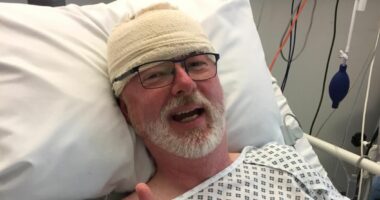Share this @internewscast.com
A leading neuroscientist has revealed the eight daily habits she encourages her elderly mother to follow in a bid to slow the progression of dementia—and says they could change the way we think about the condition.
Professor Catherine Loveday, 56, a specialist in memory and ageing at the University of Westminster, turned to her own research when her mother, Scillia, began showing early signs of Alzheimer’s.
Diagnosed in 2017 at the age of 70, Scillia’s symptoms were initially so subtle doctors might not have picked them up for another six or seven years.
But her daughter noticed she had started to repeat herself—and, armed with expert knowledge, acted fast.
Now 85, Scillia still lives independently and enjoys a good quality of life—something Professor Loveday credits to a set of evidence-based lifestyle interventions designed to support brain health.
Speaking to The Times, she said: ‘My work has taught me that there are science-backed steps we can all take to improve our brain health.
‘[This is] not only through more exercise, better diet and improved sleep, but by keeping the stress and anxiety that accompany memory loss under control.’

Professor Loveday came up with eight simple steps that her mum could implement into her routine including journaling, getting out the house and listening to music that she believes helped slow down the progression of the disease
Stress, she explained, raises levels of inflammatory markers in the body—which may in turn accelerate cognitive decline.
Professor Loveday is now sharing the routine she developed with her mother in the hope that it will help others feel empowered to act early and do everything they can to protect memory and mental clarity.
Then, despite having always been fiercely independent, she got lost on her daily walk––a red-flag warning sign of cognitive decline.
Determined to get a clearer picture of what was going on, Prof Loveday had her mum complete a battery of memory tests used by the NHS to test for dementia.
This revealed both her strengths, such as short-term memory recall and her weaknesses.
Whilst Scilia had no problem recalling a list of words her daughter had just said, when she was asked to recall the same words just half an hour later after reading a story, she performed worse than nearly 100 per cent of people.
According to Prof Loveday, this proved that her prefrontal cortex––the area of the brain responsible for problem-solving––was functioning well but the part of the brain that deals with memory was lacking.
This is one of the first tell-tale signs of Alzheimer’s disease. This is then followed by problems with thinking and reasoning and language difficulties which worsen over time.
But, if anything Prof Loveday was ‘relieved’ by the results as she knew this meant they could ‘do something about it’.
She said: ‘The measures we took have slowed decline but her Alzheimer’s obviously continues to progress.
‘Mum now has limited access to her past memories, but the work we did means we know exactly what makes her feel happy and we put that into practice every day.
‘Last time I was with her, I asked, ‘How do you feel?’ and she said, ‘Relaxed and at peace,’ and I don’t think we can ask for more.
‘We were able to really make a difference.’
Here’s exactly what you can do to boost your quality of life and stave off Alzheimers…according to Prof Loveday.
Journal every evening
To keep your brain active in old age, Prof Loveday recommends jotting down everything you did today before going to bed.
Doing this forces the brain to practice ‘spaced repetition’––a learning technique that is known to improve memory by reviewing information at intervals.
And it can be ‘transformational’, Prof Loveday claims.

Around 900,000 Britons are currently thought to have the memory-robbing disorder. But University College London scientists estimate this will rise to 1.7 million within two decades as people live longer. It marks a 40 per cent uptick on the previous forecast in 2017
Boost your social battery
According to Loveday, maintaining friendships is vital for healthy cognitive function, lowering stress and easing anxiety which in turn reduces inflammation in the body that is known to impact the progression of the disease.
Write it down and don’t be afraid to rely on technology
One of the most fool-proof ways to remember something is writing it down and this isn’t something to be ashamed of, Prof Loveday says.
She found that getting her mother to write things down that she needed to remember that day on a whiteboard in the kitchen really helped slow down the progression of the disease .
And whilst it may seem like a tedious task, Prof Loveday says one of the best things you can do for someone with a degenerative memory condition is teach them how to use Google Maps.
‘One of the worse things you can do when lost is panic’, she said.
But this is also works both ways, so for her own peace of mind as a carer she also turned on the tracking system on her mother’s phone so she can easily see where she is if needs be.
Curate old memories
Typically, Alzheimer’s patients will have a good grasp on their early memories so sparking a conversation about the good old days can help preserve identity.
Prof Loveday said: ‘Nostalgic conversations––about music and scratchy school uniforms––are powerful social connectors.
‘I know from my research if you ask people to give their eight favourite songs, often one or two will prompt memories about a specific moment that was transitional or important in terms of who you became.’
Get your steps in
It is a well-known fact that upping your exercise quota can help stave off Alzheimer’s in later life, boosting proteins in the brain that support cognitive function.
Even just going for a walk is great says Prof Loveday, because navigating stimulates the part of the brain responsible for memory.
Cut down on sugar and have a good bedtime routine
Experts have long proposed that diets high in healthy fats and polyphenols––found in things like dark green leafy vegetables––can help support brain health.
Conversely, it is well-known that sugar can have an inflammatory effect on the body, causing glucose spikes which have been shown to reduce cognitive function.
Prof Loveday suggests eating more vegetables, berries rich in antioxidants and foods high in omega-3s such as oily fish or nuts and seeds.
There is also surmounting evidence that too much or too little sleep can raise dementia risk.
Plan for the future now
Whilst it can be hard talking about future plans in terms of care, Prof Loveday advises getting the conversation out of the way as soon as possible, before the disease progresses further.
Get your eyes and ears tested
Finally Prof Loveday suggests getting your hearing and vision tested regularly to keep dementia at bay––and at least once every two years for people over 60, in line with NHS guidelines.
It is believed that tackling hearing loss early could delay the development of dementia for a number of years, though the exact reasoning is not yet fully understood by experts.
But, hearing loss is not an inevitable part of ageing and this simple step could help millions reduce their risk of dementia.














